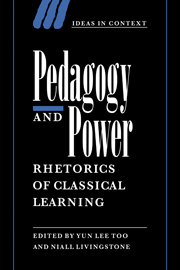Book contents
- Frontmatter
- Contents
- Notes on contributors
- Acknowledgements
- Introduction
- 1 Classics: from discipline in crisis to (multi-)cultural capital
- 2 Schoolboys and gentlemen: classical pedagogy and authority in the English public school
- 3 ‘Die Zung’ ist dieses Schwert': classical tongues and gendered curricula in German schooling to 1908
- 4 ‘What does that argue for us?’: the politics of teaching and political education in late eighteenth-century dialogues
- 5 Women and classical education in the early modern period
- 6 Pilgrimage to Parnassus: local intellectual traditions, humanist education and the cultural geography of sixteenth-century England
- 7 ‘Not so much praise as precept’: Erasmus, panegyric, and the Renaissance art of teaching princes
- 8 Teachers, pupils and imperial power in eleventh-century Byzantium
- 9 Reading power in Roman Greece: the paideia of Dio Chrysostom
- 10 Children, animals, slaves and grammar
- 11 A good man skilled in politics: Quintilian's political theory
- 12 The voice of Isocrates and the dissemination of cultural power
- 13 Xenophon's Cyropaedia: disfiguring the pedagogical state
- Select bibliography
- Index
- IDEAS IN CONTEXT
1 - Classics: from discipline in crisis to (multi-)cultural capital
Published online by Cambridge University Press: 30 September 2009
- Frontmatter
- Contents
- Notes on contributors
- Acknowledgements
- Introduction
- 1 Classics: from discipline in crisis to (multi-)cultural capital
- 2 Schoolboys and gentlemen: classical pedagogy and authority in the English public school
- 3 ‘Die Zung’ ist dieses Schwert': classical tongues and gendered curricula in German schooling to 1908
- 4 ‘What does that argue for us?’: the politics of teaching and political education in late eighteenth-century dialogues
- 5 Women and classical education in the early modern period
- 6 Pilgrimage to Parnassus: local intellectual traditions, humanist education and the cultural geography of sixteenth-century England
- 7 ‘Not so much praise as precept’: Erasmus, panegyric, and the Renaissance art of teaching princes
- 8 Teachers, pupils and imperial power in eleventh-century Byzantium
- 9 Reading power in Roman Greece: the paideia of Dio Chrysostom
- 10 Children, animals, slaves and grammar
- 11 A good man skilled in politics: Quintilian's political theory
- 12 The voice of Isocrates and the dissemination of cultural power
- 13 Xenophon's Cyropaedia: disfiguring the pedagogical state
- Select bibliography
- Index
- IDEAS IN CONTEXT
Summary
The unexamined curriculum is not worth teaching
Some thirty years ago, the distinguished early modern historian and acclaimed popularizer, J. H. (now Sir Jack) Plumb, responded to what he perceived to be a ‘crisis in the humanities’ by editing a volume of essays under that title. Somewhat paradoxically, perhaps, he included therein a typically astringent and comparative but also firmly optimistic essay on ‘Classics’ by his Cambridge colleague Moses (later Sir Moses) Finley, a no less distinguished pedagogue. Finley's optimism stemmed chiefly from his belief that Classics would survive by being transformed, into non-philological (or not primarily philological) ‘Classical Studies’ or ‘Classical Civilization’. A quarter of a century later, despite – or because of? – the immense growth in the popularity and influence of non-linguistic Classical Civilization (or Classical Studies, Classics in Translation) courses in both schools and universities, not to mention among the wider public, a group of leading academics on the other side of the Atlantic combined to produce Classics: a Discipline and a Profession in Crisis?, the terminal interrogative neatly encapsulating the ambiguity both of ‘Classics’ and of ‘crisis’ (everything going wrong – or moment of decision).
Since 1989, the situation of Classics, and the Humanities more generally, may be thought to have become if anything yet more politically fraught. No longer is the talk merely of ‘crisis’.
- Type
- Chapter
- Information
- Pedagogy and PowerRhetorics of Classical Learning, pp. 16 - 28Publisher: Cambridge University PressPrint publication year: 1998
- 5
- Cited by

